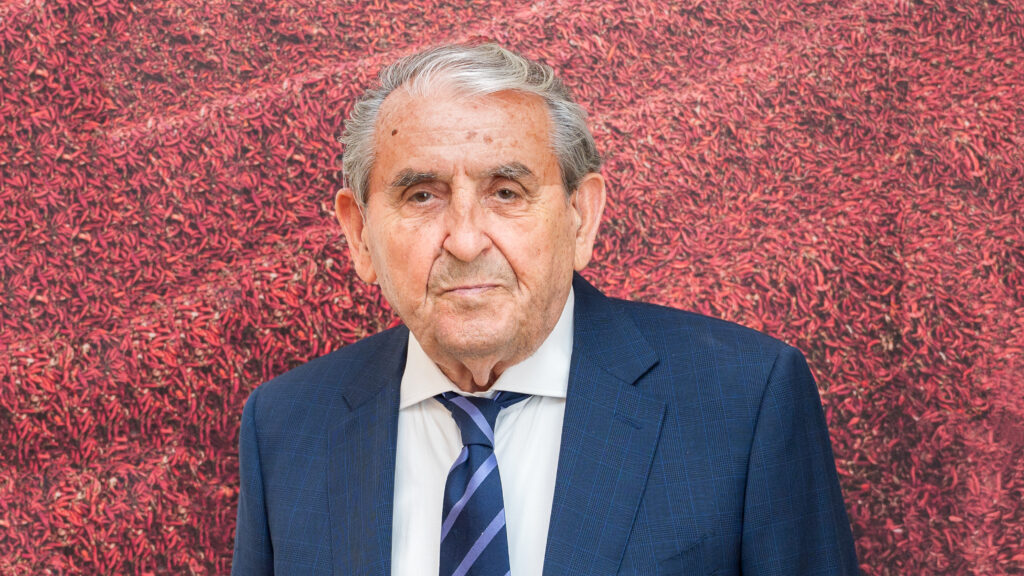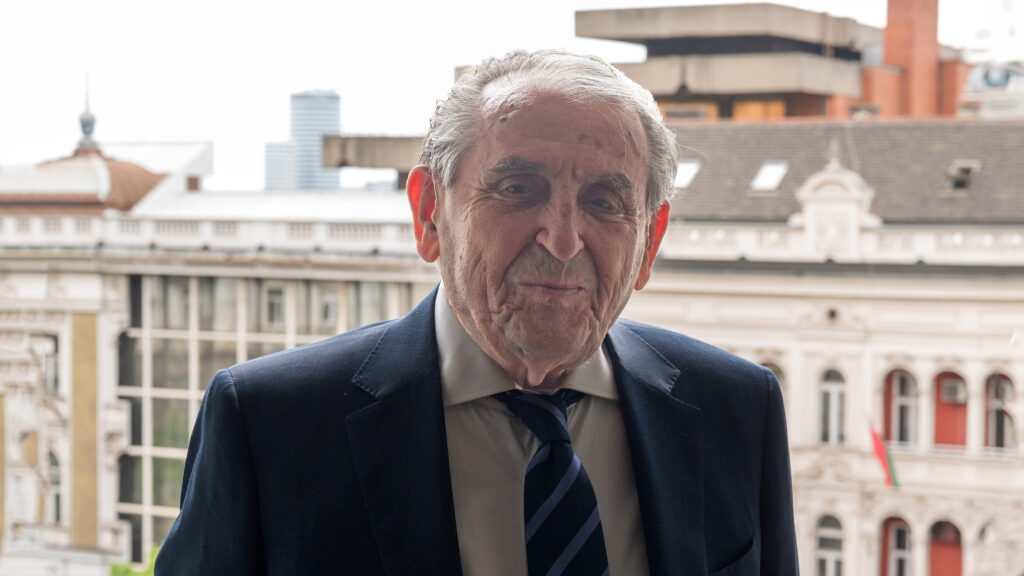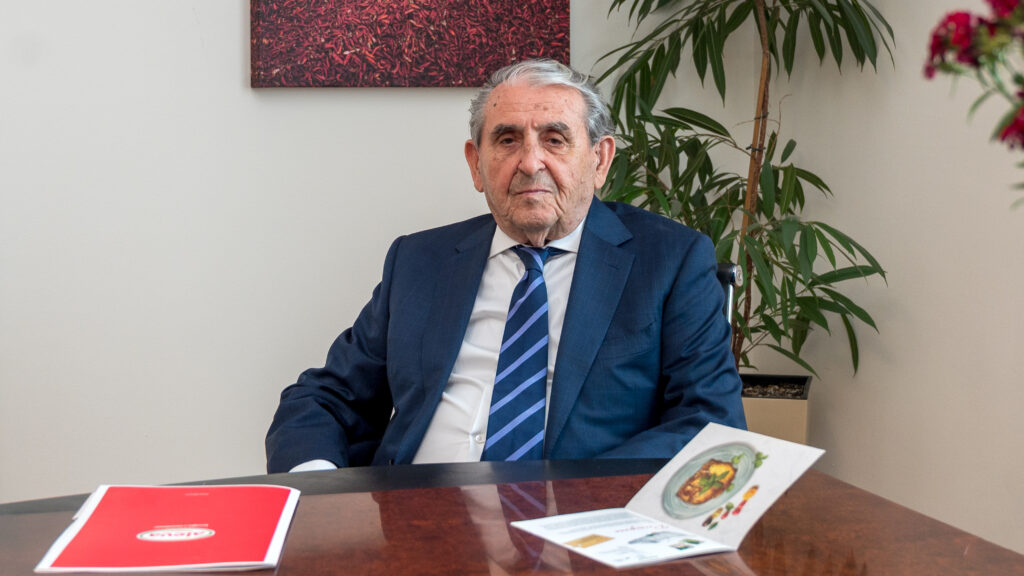On values, legacy, and the future of one of Serbia’s longest-standing companies through the eyes of its founder and tireless visionary
 Born and raised in Kruševac, Hristivoje Milošević, president of company Aleva, after completing his studies in Belgrade, returned to his hometown and took up a position at the company “Merima”, where he had previously been a scholarship recipient. There, he gained valuable knowledge and experience, progressing from scholarship holder to production engineer and eventually to General Director, during a period when the company grew into one of the most important enterprises in the former Yugoslavia. From “Merima”, he moved to “Inex Interexport”, joining their representative office in Russia, where he relocated with his family for an extended period. He returned to Serbia in 2003 and opened a modern cereal-based baby food factory, “Flory”, in his hometown of Kruševac. Since 2005, he has been the owner of “Aleva” from Novi Kneževac.
Born and raised in Kruševac, Hristivoje Milošević, president of company Aleva, after completing his studies in Belgrade, returned to his hometown and took up a position at the company “Merima”, where he had previously been a scholarship recipient. There, he gained valuable knowledge and experience, progressing from scholarship holder to production engineer and eventually to General Director, during a period when the company grew into one of the most important enterprises in the former Yugoslavia. From “Merima”, he moved to “Inex Interexport”, joining their representative office in Russia, where he relocated with his family for an extended period. He returned to Serbia in 2003 and opened a modern cereal-based baby food factory, “Flory”, in his hometown of Kruševac. Since 2005, he has been the owner of “Aleva” from Novi Kneževac.
You have received numerous awards – from “The Best European” and the Captain Miša Anastasijević Award to the title of Honorary Citizen of Novi Kneževac, the town where Aleva’s facilities are located. You were recently honoured with a Lifetime Achievement Award by Diplomacy & Commerce magazine. What do such accolades mean to someone of your age and experience?
Awards are a confirmation that you are doing something right and that others recognise it. I grew up in very modest circumstances, and it was precisely that difficult start that gave me the strength to fight for success. When you know that you won’t be handed education or a job on a plate, you have to rely on yourself and your own work. I have always strived to give my best throughout my career, regardless of whether I was an employee or a business owner. I believe people recognise and appreciate that kind of dedication, which, over time, is reflected in the awards you receive.
As far as I know, you still come to work every day. What does a working day look like for someone in their tenth decade of life?
Yes, I still come to work every day, although my working day is much more relaxed. I regularly follow sales reports and attend quarterly meetings where results and growth plans are presented. I enjoy hearing different opinions from employees about current developments – I simply like to stay informed. I find it fulfilling to remain professionally active and to pass on my knowledge to younger generations. Aleva now has a professional management team, but the family remains actively involved, especially my grandchildren, Jelena and Vladimir.
 Statistics show that in our region, only 21% of family businesses survive the transition from the first to the second generation, and just 1% make it to the third. How did you manage to be part of that 1%?
Statistics show that in our region, only 21% of family businesses survive the transition from the first to the second generation, and just 1% make it to the third. How did you manage to be part of that 1%?
Times inevitably change, and we must adapt. We were fortunate that our successors had an interest in business rather than pursuing other professions. I was greatly helped by my advisor and friend, Milan Kovačević, who guided me along the way, as well as by working with internationally renowned consulting firms that helped us develop a long-term succession plan.
You have witnessed business operations across various systems and eras – from socialism during Tito’s time, through the post-Tito period, transitional Russia in the 1990s, and Serbia’s own transition in the 2000s, to the present day. What would you highlight as the key moments of your career?
After graduating from university in Belgrade, I returned to my hometown of Kruševac and began my business career at Merima. This company gave me the opportunity to receive training abroad, allowing me to gain valuable knowledge and experience, which I later applied to the development and improvement of detergent, chemical, and cosmetic production. After ten years as General Director, in May 1978, I moved to Russia as a representative of the company Inex-Interexport. At that time, Western companies were not allowed direct access to the Russian market, while Inex-Interexport, as a Yugoslav company, enjoyed a privileged status. I recognised great potential to improve operations and consistently exceeded the set targets. Interestingly, I was the one who secured the first contract with Estée Lauder in the USSR. At the beginning of 2003, I returned to Serbia and that is when the business idea to open the baby food factory Flory was born. Following that investment, I realised that the food industry was a field worth focusing on, and in 2005, I became the owner of Aleva. Each of these stages holds a special significance for me, and I learned something valuable from each of them.
Maintaining the status quo is not an option on the global market
What are you particularly proud of when it comes to the Aleva company – what did the “change for the better” look like?
I am especially proud of the consistent growth and the continuous improvement and strengthening of all segments of the business – from staffing and technology to product range. Aleva represents a blend of experience, quality, and tradition, and these values will continue to be the company’s foundation in securing its place on the market. The expansion of exports, not only regionally (to former Yugoslav countries) but globally, is further proof of the product quality. At present, we have ambitious plans for export growth, with exports currently accounting for over 35% of total turnover.
How do you deal with global competition?
My international experience and contacts with numerous globally renowned companies have helped me to continuously learn and adapt to market trends. Companies such as Henkel, HACO, and Kotányi have significantly influenced my way of thinking, and I see competition as a stimulus and inspiration for improvement. Competition always motivates you to progress and develop new ideas. Maintaining the status quo is not an option on the global market.
Have you ever considered selling the company to a global player, as has been the case with most major food industry firms in our country?
There has been interest and a few proposals for discussions, but I have never seriously considered it. I believe in the domestic economy and think it is important to preserve local identity and protect employees who have been part of the company for years. That is the case with the factory in Novi Kneževac, where over 190 people are employed. Generations have passed through the factory, and it is not uncommon for entire families to work in our company. Their loyalty deserves to be valued.
How does your company engage with the local community in Novi Kneževac? Do you carry out any CSR projects locally?
As I mentioned, caring for employees and the local community should be a standard for all businesspeople. I have always wholeheartedly supported all initiatives, and I would highlight the following regular activities: donations of goods to the Red Cross, the retirement home, and the hospital; support for the restoration of the Serbian Orthodox Church of the Holy Archistrategos Gabriel in Obilićevo; and a few years ago, we donated a car to the local health centre. These activities represent our contribution to improving living conditions in the local community, and we plan to continue with similar projects in the future.
 In two years, Aleva will celebrate its 80th anniversary. The numbers show that you process 10,000 tonnes of vegetables annually and export your 100 products to 50 countries around the world. What are your plans leading up to the company’s 80th birthday?
In two years, Aleva will celebrate its 80th anniversary. The numbers show that you process 10,000 tonnes of vegetables annually and export your 100 products to 50 countries around the world. What are your plans leading up to the company’s 80th birthday?
Our company values the work of loyal employees, while also welcoming the fresh energy that new staff bring. We believe that team diversity is key to original ideas and projects, as it allows for different perspectives. Our most well-known product, Aleva paprika, is synonymous with this type of spice. Since 1947, when our tradition of processing, grinding, and packaging ground paprika began, it has remained our best-selling product. In addition, we have developed a wide range of products for preparing traditional dishes.
As consumer habits and needs change, so does our product portfolio. Market trends show a shift from family-sized to individual packaging. We are currently developing the Quik instant meal segment – both savoury and sweet – which are practical and can be taken and consumed on the go. Our company has always been consumer-focused, and we will continue to invest in innovation.
Our business philosophy is to create a balanced and thoughtful market presence – starting from a high-quality product, affordable pricing, targeted distribution, and moderate promotion. Only in this way can we ensure the success of what the company ultimately stands for.
I believe people recognise and appreciate that kind of dedication, which, over time, is reflected in the awards you receive
Finally, what advice would you share with younger generations in business?
Through my experience, I have learned several important lessons that I would like to share. Surround yourself with good and capable people. Throughout my career, I have always relied on the diligence and competence of my colleagues, showing trust and respect to every employee. Make important life decisions with a sense of responsibility towards others. People should be valued by their actions, not their words. Don’t hesitate to take initiative and go beyond your job description. At times, you will have to make decisions based on incomplete information – this should not frighten you, but rather motivate you to act responsibly and consider the interests of all parties involved. Learn throughout your life and stay attuned to trends. Education is essential, as it is the only way to remain competent and meet the challenges of the modern age. Progress in business is impossible without new ideas and innovation. True opportunities are assessed and recognised, even when they are not obvious to most people. Private life must be in balance with business. Family should always come first, as they are the ones who stand by you through both good times and bad. In the end, I believe that the foundation of success – both in business and in family – lies in respect, trust, and goodwill. These values are essential for long-term stability and progress.